- Home
- H. P. Lovecraft
The Complete H.P. Lovecraft Collection (Xist Classics) Page 52
The Complete H.P. Lovecraft Collection (Xist Classics) Read online
Page 52
I know now why Andrews was so secretive in his actions; so damnably gloating in his attitude toward me after my artificial death. He had meant me for a specimen all the time—a specimen of his greatest feat of surgery, his masterpiece of unclean witchery . . . an example of perverted artistry for him alone to see. Where Andrews obtained that other with which I lay accursed in his moldering mansion I shall probably never know; but I am afraid that it was brought from Haiti along with his fiendish medicine. At least these long hairy arms and horrible short legs are alien to me . . . alien to all natural and sane laws of mankind. The thought that I shall be tortured with that other during the rest of my brief existence is another hell.
Now I can but wish for that which once was mine; that which every man blessed of God ought to have at death; that which I saw in that awful moment in the ancient burial ground when I raised the lid on the coffin—my own shrunken, decayed, and headless body.
The Doom That Came to Sarnath
There is in the land of Mnar a vast still lake that is fed by no stream and out of which no stream flows. Ten thousand years ago there stood by its shore the mighty city of Sarnath, but Sarnath stands there no more.
It is told that in the immemorial years when the world was young, before ever the men of Sarnath came to the land of Mnar, another city stood beside the lake; the grey stone city of Ib, which was old as the lake itself, and peopled with beings not pleasing to behold. Very odd and ugly were these beings, as indeed are most beings of a world yet inchoate and rudely fashioned. It is written on the brick cylinders of Kadatheron that the beings of Ib were in hue as green as the lake and the mists that rise above it; that they had bulging eyes, pouting, flabby lips, and curious ears, and were without voice. It is also written that they descended one night from the moon in a mist; they and the vast still lake and grey stone city Ib. However this may be, it is certain that they worshipped a sea-green stone idol chiselled in the likeness of Bokrug, the great water-lizard; before which they danced horribly when the moon was gibbous. And it is written in the papyrus of Ilarnek, that they one day discovered fire, and thereafter kindled flames on many ceremonial occasions. But not much is written of these beings, because they lived in very ancient times, and man is young, and knows little of the very ancient living things.
After many aeons men came to the land of Mnar; dark shepherd folk with their fleecy flocks, who built Thraa, Ilarnek, and Kadatheron on the winding river Ai. And certain tribes, more hardy than the rest, pushed on to the border of the lake and built Sarnath at a spot where precious metals were found in the earth.
Not far from the grey city of Ib did the wandering tribes lay the first stones of Sarnath, and at the beings of Ib they marvelled greatly. But with their marvelling was mixed hate, for they thought it not meet that beings of such aspect should walk about the world of men at dusk. Nor did they like the strange sculptures upon the grey monoliths of Ib, for those sculptures were terrible with great antiquity. Why the beings and the sculptures lingered so late in the world, even until the coming of men, none can tell; unless it was because the land of Mnar is very still, and remote from most other lands both of waking and of dream.
As the men of Sarnath beheld more of the beings of Ib their hate grew, and it was not less because they found the beings weak, and soft as jelly to the touch of stones and spears and arrows. So one day the young warriors, the slingers and the spearmen and the bowmen, marched against Ib and slew all the inhabitants thereof, pushing the queer bodies into the lake with long spears, because they did not wish to touch them. And because they did not like the grey sculptured monoliths of Ib they cast these also into the lake; wondering from the greatness of the labour how ever the stones were brought from afar, as they must have been, since there is naught like them in all the land of Mnar or in the lands adjacent.
Thus of the very ancient city of Ib was nothing spared save the sea-green stone idol chiselled in the likeness of Bokrug, the water-lizard. This the young warriors took back with them to Sarnath as a symbol of conquest over the old gods and beings of Ib, and a sign of leadership in Mnar. But on the night after it was set up in the temple a terrible thing must have happened, for weird lights were seen over the lake, and in the morning the people found the idol gone, and the high-priest Taran-Ish lying dead, as from some fear unspeakable. And before he died, Taran-Ish had scrawled upon the altar of chrysolite with coarse shaky strokes the sign of DOOM.
After Taran-Ish there were many high-priests in Sarnath, but never was the sea-green stone idol found. And many centuries came and went, wherein Sarnath prospered exceedingly, so that only priests and old women remembered what Taran-Ish had scrawled upon the altar of chrysolite. Betwixt Sarnath and the city of Ilarnek arose a caravan route, and the precious metals from the earth were exchanged for other metals and rare cloths and jewels and books and tools for artificers and all things of luxury that are known to the people who dwell along the winding river Ai and beyond. So Sarnath waxed mighty and learned and beautiful, and sent forth conquering armies to subdue the neighbouring cities; and in time there sate upon a throne in Sarnath the kings of all the land of Mnar and of many lands adjacent.
The wonder of the world and the pride of all mankind was Sarnath the magnificent. Of polished desert-quarried marble were its walls, in height 300 cubits and in breadth 75, so that chariots might pass each other as men drave them along the top. For full 500 stadia did they run, being open only on the side toward the lake; where a green stone sea-wall kept back the waves that rose oddly once a year at the festival of the destroying of Ib. In Sarnath were fifty streets from the lake to the gates of the caravans, and fifty more intersecting them. With onyx were they paved, save those whereon the horses and camels and elephants trod, which were paved with granite. And the gates of Sarnath were as many as the landward ends of the streets, each of bronze, and flanked by the figures of lions and elephants carven from some stone no longer known among men. The houses of Sarnath were of glazed brick and chalcedony, each having its walled garden and crystal lakelet. With strange art were they builded, for no other city had houses like them; and travellers from Thraa and Ilarnek and Kadatheron marvelled at the shining domes wherewith they were surmounted.
But more marvellous still were the palaces and the temples, and the gardens made by Zokkar the olden king. There were many palaces, the least of which were mightier than any in Thraa or Ilarnek or Kadatheron. So high were they that one within might sometimes fancy himself beneath only the sky; yet when lighted with torches dipt in the oil of Dothur their walls shewed vast paintings of kings and armies, of a splendour at once inspiring and stupefying to the beholder. Many were the pillars of the palaces, all of tinted marble, and carven into designs of surpassing beauty. And in most of the palaces the floors were mosaics of beryl and lapis-lazuli and sardonyx and carbuncle and other choice materials, so disposed that the beholder might fancy himself walking over beds of the rarest flowers. And there were likewise fountains, which cast scented waters about in pleasing jets arranged with cunning art. Outshining all others was the palace of the kings of Mnar and of the lands adjacent. On a pair of golden crouching lions rested the throne, many steps above the gleaming floor. And it was wrought of one piece of ivory, though no man lives who knows whence so vast a piece could have come. In that palace there were also many galleries, and many amphitheatres where lions and men and elephants battled at the pleasure of the kings. Sometimes the amphitheatres were flooded with water conveyed from the lake in mighty aqueducts, and then were enacted stirring sea-fights, or combats betwixt swimmers and deadly marine things.
Lofty and amazing were the seventeen tower-like temples of Sarnath, fashioned of a bright multi-coloured stone not known elsewhere. A full thousand cubits high stood the greatest among them, wherein the high-priests dwelt with a magnificence scarce less than that of the kings. On the ground were halls as vast and splendid as those of the palaces; where gathered throngs in worship of Zo-Kalar and Tamash and Lobon, the chief gods of Sarna
th, whose incense-enveloped shrines were as the thrones of monarchs. Not like the eikons of other gods were those of Zo-Kalar and Tamash and Lobon, for so close to life were they that one might swear the graceful bearded gods themselves sate on the ivory thrones. And up unending steps of shining zircon was the tower-chamber, wherefrom the high-priests looked out over the city and the plains and the lake by day; and at the cryptic moon and significant stars and planets, and their reflections in the lake, by night. Here was done the very secret and ancient rite in detestation of Bokrug, the water-lizard, and here rested the altar of chrysolite which bore the DOOM-scrawl of Taran-Ish.
Wonderful likewise were the gardens made by Zokkar the olden king. In the centre of Sarnath they lay, covering a great space and encircled by a high wall. And they were surmounted by a mighty dome of glass, through which shone the sun and moon and stars and planets when it was clear, and from which were hung fulgent images of the sun and moon and stars and planets when it was not clear. In summer the gardens were cooled with fresh odorous breezes skilfully wafted by fans, and in winter they were heated with concealed fires, so that in those gardens it was always spring. There ran little streams over bright pebbles, dividing meads of green and gardens of many hues, and spanned by a multitude of bridges. Many were the waterfalls in their courses, and many were the lilied lakelets into which they expanded. Over the streams and lakelets rode white swans, whilst the music of rare birds chimed in with the melody of the waters. In ordered terraces rose the green banks, adorned here and there with bowers of vines and sweet blossoms, and seats and benches of marble and porphyry. And there were many small shrines and temples where one might rest or pray to small gods.
Each year there was celebrated in Sarnath the feast of the destroying of Ib, at which time wine, song, dancing, and merriment of every kind abounded. Great honours were then paid to the shades of those who had annihilated the odd ancient beings, and the memory of those beings and of their elder gods was derided by dancers and lutanists crowned with roses from the gardens of Zokkar. And the kings would look out over the lake and curse the bones of the dead that lay beneath it. At first the high-priests liked not these festivals, for there had descended amongst them queer tales of how the sea-green eikon had vanished, and how Taran-Ish had died from fear and left a warning. And they said that from their high tower they sometimes saw lights beneath the waters of the lake. But as many years passed without calamity even the priests laughed and cursed and joined in the orgies of the feasters. Indeed, had they not themselves, in their high tower, often performed the very ancient and secret rite in detestation of Bokrug, the water-lizard? And a thousand years of riches and delight passed over Sarnath, wonder of the world and pride of all mankind.
Gorgeous beyond thought was the feast of the thousandth year of the destroying of Ib. For a decade had it been talked of in the land of Mnar, and as it drew nigh there came to Sarnath on horses and camels and elephants men from Thraa, Ilarnek, and Kadatheron, and all the cities of Mnar and the lands beyond. Before the marble walls on the appointed night were pitched the pavilions of princes and the tents of travellers, and all the shore resounded with the song of happy revellers. Within his banquet-hall reclined Nargis-Hei, the king, drunken with ancient wine from the vaults of conquered Pnath, and surrounded by feasting nobles and hurrying slaves. There were eaten many strange delicacies at that feast; peacocks from the isles of Nariel in the Middle Ocean, young goats from the distant hills of Implan, heels of camels from the Bnazic desert, nuts and spices from Cydathrian groves, and pearls from wave-washed Mtal dissolved in the vinegar of Thraa. Of sauces there were an untold number, prepared by the subtlest cooks in all Mnar, and suited to the palate of every feaster. But most prized of all the viands were the great fishes from the lake, each of vast size, and served up on golden platters set with rubies and diamonds.
Whilst the king and his nobles feasted within the palace, and viewed the crowning dish as it awaited them on golden platters, others feasted elsewhere. In the tower of the great temple the priests held revels, and in pavilions without the walls the princes of neighbouring lands made merry. And it was the high-priest Gnai-Kah who first saw the shadows that descended from the gibbous moon into the lake, and the damnable green mists that arose from the lake to meet the moon and to shroud in a sinister haze the towers and the domes of fated Sarnath. Thereafter those in the towers and without the walls beheld strange lights on the water, and saw that the grey rock Akurion, which was wont to rear high above it near the shore, was almost submerged. And fear grew vaguely yet swiftly, so that the princes of Ilarnek and of far Rokol took down and folded their tents and pavilions and departed for the river Ai, though they scarce knew the reason for their departing.
Then, close to the hour of midnight, all the bronze gates of Sarnath burst open and emptied forth a frenzied throng that blackened the plain, so that all the visiting princes and travellers fled away in fright. For on the faces of this throng was writ a madness born of horror unendurable, and on their tongues were words so terrible that no hearer paused for proof. Men whose eyes were wild with fear shrieked aloud of the sight within the king’s banquet-hall, where through the windows were seen no longer the forms of Nargis-Hei and his nobles and slaves, but a horde of indescribable green voiceless things with bulging eyes, pouting, flabby lips, and curious ears; things which danced horribly, bearing in their paws golden platters set with rubies and diamonds containing uncouth flames. And the princes and travellers, as they fled from the doomed city of Sarnath on horses and camels and elephants, looked again upon the mist-begetting lake and saw the grey rock Akurion was quite submerged.
Through all the land of Mnar and the lands adjacent spread the tales of those who had fled from Sarnath, and caravans sought that accursed city and its precious metals no more. It was long ere any traveller went thither, and even then only the brave and adventurous young men of distant Falona dared make the journey; adventurous young men of yellow hair and blue eyes, who are no kin to the men of Mnar. These men indeed went to the lake to view Sarnath; but though they found the vast still lake itself, and the grey rock Akurion which rears high above it near the shore, they beheld not the wonder of the world and pride of all mankind. Where once had risen walls of 300 cubits and towers yet higher, now stretched only the marshy shore, and where once had dwelt fifty millions of men now crawled only the detestable green water-lizard. Not even the mines of precious metal remained, for DOOM had come to Sarnath.
But half buried in the rushes was spied a curious green idol of stone; an exceedingly ancient idol coated with seaweed and chiselled in the likeness of Bokrug, the great water-lizard. That idol, enshrined in the high temple at Ilarnek, was subsequently worshipped beneath the gibbous moon throughout the land of Mnar.
The Dream-Quest of Unknown Kadath
Three times Randolph Carter dreamed of the marvellous city, and three times was he snatched away while still he paused on the high terrace above it. All golden and lovely it blazed in the sunset, with walls, temples, colonnades, and arched bridges of veined marble, silver-basined fountains of prismatic spray in broad squares and perfumed gardens, and wide streets marching between delicate trees and blossom-laden urns and ivory statues in gleaming rows; while on steep northward slopes climbed tiers of red roofs and old peaked gables harbouring little lanes of grassy cobbles. It was a fever of the gods; a fanfare of supernal trumpets and a clash of immortal cymbals. Mystery hung about it as clouds about a fabulous unvisited mountain; and as Carter stood breathless and expectant on that balustraded parapet there swept up to him the poignancy and suspense of almost-vanished memory, the pain of lost things, and the maddening need to place again what once had an awesome and momentous place.
He knew that for him its meaning must once have been supreme; though in what cycle or incarnation he had known it, or whether in dream or in waking, he could not tell. Vaguely it called up glimpses of a far, forgotten first youth, when wonder and pleasure lay in all the mystery of days, and dawn and dus
k alike strode forth prophetick to the eager sound of lutes and song; unclosing faery gates toward further and surprising marvels. But each night as he stood on that high marble terrace with the curious urns and carven rail and looked off over that hushed sunset city of beauty and unearthly immanence, he felt the bondage of dream’s tyrannous gods; for in no wise could he leave that lofty spot, or descend the wide marmoreal flights flung endlessly down to where those streets of elder witchery lay outspread and beckoning.
When for the third time he awaked with those flights still undescended and those hushed sunset streets still untraversed, he prayed long and earnestly to the hidden gods of dream that brood capricious above the clouds on unknown Kadath, in the cold waste where no man treads. But the gods made no answer and shewed no relenting, nor did they give any favouring sign when he prayed to them in dream, and invoked them sacrificially through the bearded priests Nasht and Kaman-Thah, whose cavern-temple with its pillar of flame lies not far from the gates of the waking world. It seemed, however, that his prayers must have been adversely heard, for after even the first of them he ceased wholly to behold the marvellous city; as if his three glimpses from afar had been mere accidents or oversights, and against some hidden plan or wish of the gods.
At length, sick with longing for those glittering sunset streets and cryptical hill lanes among ancient tiled roofs, nor able sleeping or waking to drive them from his mind, Carter resolved to go with bold entreaty whither no man had gone before, and dare the icy deserts through the dark to where unknown Kadath, veiled in cloud and crowned with unimagined stars, holds secret and nocturnal the onyx castle of the Great Ones.
In light slumber he descended the seventy steps to the cavern of flame and talked of this design to the bearded priests Nasht and Kaman-Thah. And the priests shook their pshent-bearing heads and vowed it would be the death of his soul. They pointed out that the Great Ones had shewn already their wish, and that it is not agreeable to them to be harassed by insistent pleas. They reminded him, too, that not only had no man ever been to unknown Kadath, but no man had ever suspected in what part of space it may lie; whether it be in the dreamlands around our world, or in those surrounding some unguessed companion of Fomalhaut or Aldebaran. If in our dreamland, it might conceivably be reached; but only three fully human souls since time began had ever crossed and recrossed the black impious gulfs to other dreamlands, and of that three two had come back quite mad. There were, in such voyages, incalculable local dangers; as well as that shocking final peril which gibbers unmentionably outside the ordered universe, where no dreams reach; that last amorphous blight of nethermost confusion which blasphemes and bubbles at the centre of all infinity—the boundless daemon-sultan Azathoth, whose name no lips dare speak aloud, and who gnaws hungrily in inconceivable, unlighted chambers beyond time amidst the muffled, maddening beating of vile drums and the thin, monotonous whine of accursed flutes; to which detestable pounding and piping dance slowly, awkwardly, and absurdly the gigantic ultimate gods, the blind, voiceless, tenebrous, mindless Other Gods whose soul and messenger is the crawling chaos Nyarlathotep.

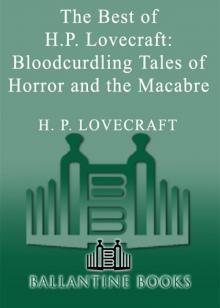 The Best of H.P. Lovecraft
The Best of H.P. Lovecraft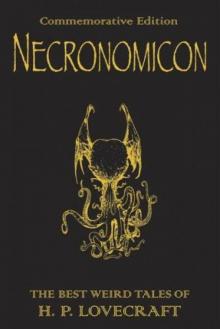 The Definitive H.P. Lovecraft: 67 Tales Of Horror In One Volume
The Definitive H.P. Lovecraft: 67 Tales Of Horror In One Volume The Complete Works of H.P. Lovecraft
The Complete Works of H.P. Lovecraft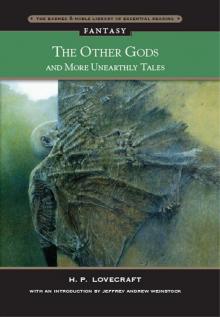 Other Gods and More Unearthly Tales
Other Gods and More Unearthly Tales Lovecraft's Fiction Volume I, 1905-1925
Lovecraft's Fiction Volume I, 1905-1925 The Shadow Out of Time
The Shadow Out of Time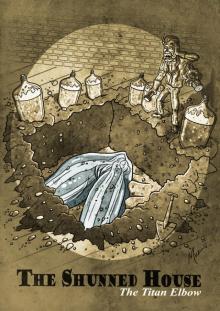 The Shunned House
The Shunned House Lovecraft's Fiction Volume II, 1926-1928
Lovecraft's Fiction Volume II, 1926-1928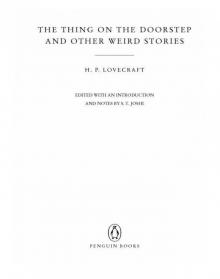 The Thing on the Doorstep and Other Weird Stories
The Thing on the Doorstep and Other Weird Stories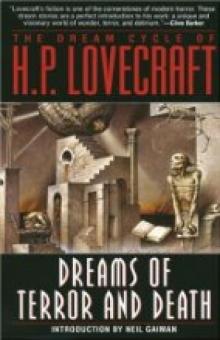 Dream Cycle of H. P. Lovecraft: Dreams of Terror and Death
Dream Cycle of H. P. Lovecraft: Dreams of Terror and Death Great Tales of Horror
Great Tales of Horror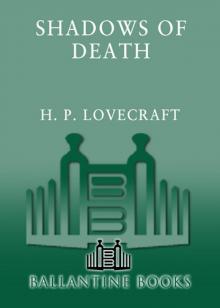 Shadows of Death
Shadows of Death Delphi Complete Works of H. P. Lovecraft (Illustrated)
Delphi Complete Works of H. P. Lovecraft (Illustrated) Waking Up Screaming: Haunting Tales of Terror
Waking Up Screaming: Haunting Tales of Terror H.P. Lovecraft Goes to the Movies
H.P. Lovecraft Goes to the Movies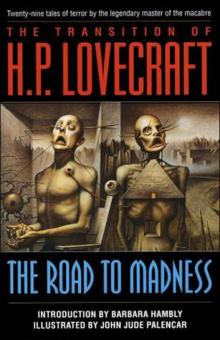 The Road to Madness
The Road to Madness The Complete H.P. Lovecraft Reader (68 Stories)
The Complete H.P. Lovecraft Reader (68 Stories)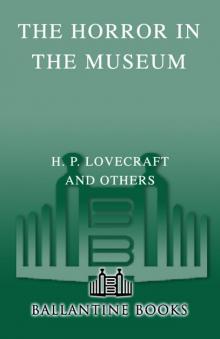 The Horror in the Museum
The Horror in the Museum Collected Fiction Volume 1 (1905-1925): A Variorum Edition
Collected Fiction Volume 1 (1905-1925): A Variorum Edition Lovecrafts_Fiction, vol.I_1905-1925
Lovecrafts_Fiction, vol.I_1905-1925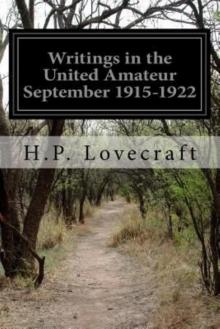 Writings in the United Amateur, 1915-1922
Writings in the United Amateur, 1915-1922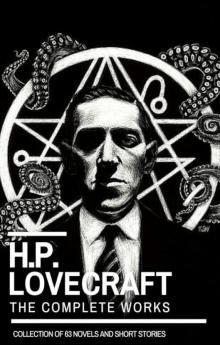 H.P. Lovecraft: The Complete Works
H.P. Lovecraft: The Complete Works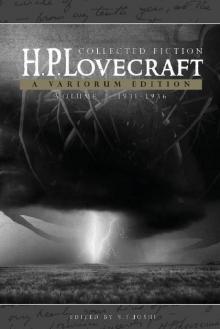 Collected Fiction Volume 3 (1931-1936): A Variorum Edition
Collected Fiction Volume 3 (1931-1936): A Variorum Edition H.P. Lovecraft: The Complete Fiction
H.P. Lovecraft: The Complete Fiction Collected Fiction Volume 2 (1926-1930): A Variorum Edition
Collected Fiction Volume 2 (1926-1930): A Variorum Edition Yog Sothothery - The Definitive H.P. Lovecraft Anthology
Yog Sothothery - The Definitive H.P. Lovecraft Anthology The Complete H.P. Lovecraft Collection (Xist Classics)
The Complete H.P. Lovecraft Collection (Xist Classics)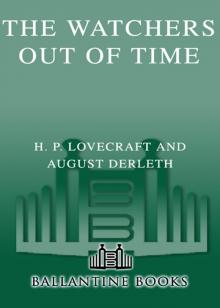 The Watchers Out of Time
The Watchers Out of Time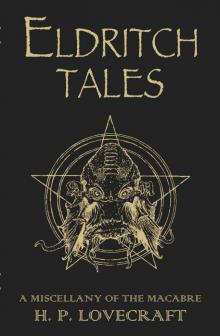 Eldritch Tales
Eldritch Tales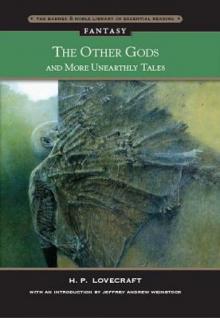 The Other Gods And More Unearthly Tales
The Other Gods And More Unearthly Tales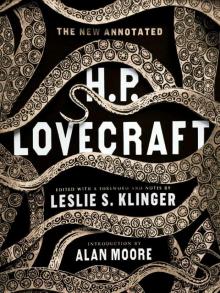 The New Annotated H. P. Lovecraft
The New Annotated H. P. Lovecraft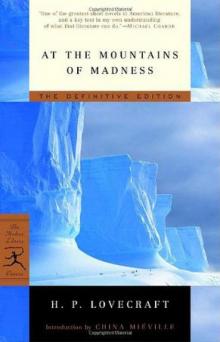 At the mountains of madness
At the mountains of madness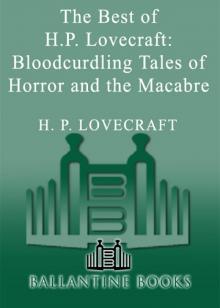 Bloodcurdling Tales of Horror and the Macabre
Bloodcurdling Tales of Horror and the Macabre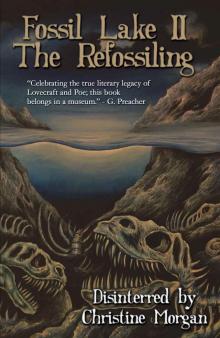 Fossil Lake II: The Refossiling
Fossil Lake II: The Refossiling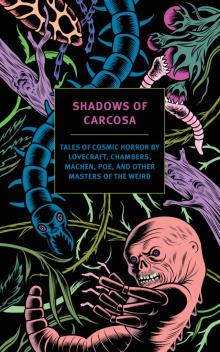 Shadows of Carcosa: Tales of Cosmic Horror by Lovecraft, Chambers, Machen, Poe, and Other Masters of the Weird
Shadows of Carcosa: Tales of Cosmic Horror by Lovecraft, Chambers, Machen, Poe, and Other Masters of the Weird H. P. Lovecraft
H. P. Lovecraft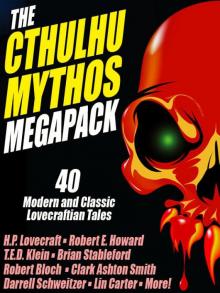 The Cthulhu Mythos Megapack
The Cthulhu Mythos Megapack The Complete H. P. Lovecraft Reader (2nd Edition)
The Complete H. P. Lovecraft Reader (2nd Edition) The Complete Fiction
The Complete Fiction Waking Up Screaming
Waking Up Screaming Transition of H. P. Lovecraft
Transition of H. P. Lovecraft![[1935] The Shadow Out of Time Read online](http://i1.bookreadfree.com/i2/04/12/1935_the_shadow_out_of_time_preview.jpg) [1935] The Shadow Out of Time
[1935] The Shadow Out of Time The Horror Megapack
The Horror Megapack